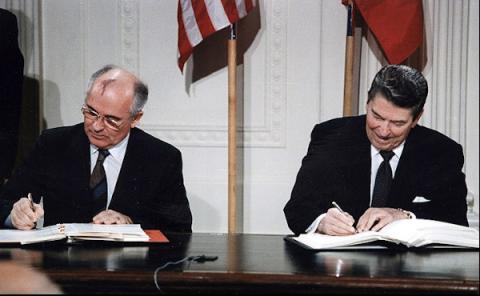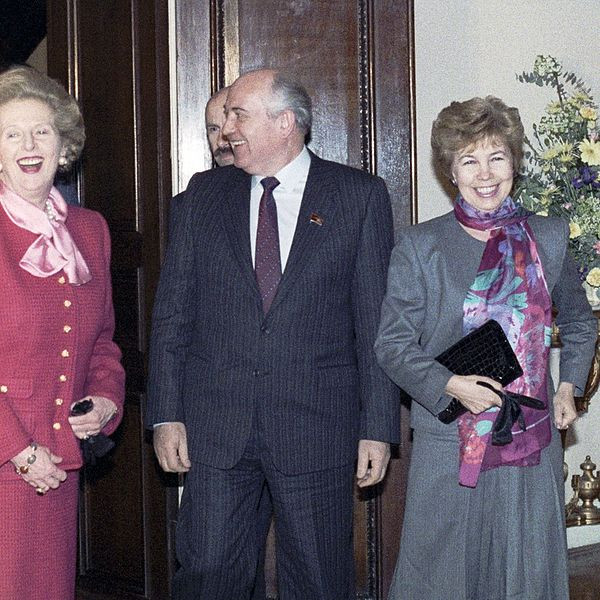Mikhail Gorbachev Warns Us About What Is at Stake

There are few things as eminently forgettable as books authored by — or, to be too honest in all too many cases, ghost-written for — politicians on the hustings. Maybe books by cable news pundits make an admirable attempt to compete for this. One shouldn't attach any contempt to this label; it just seems a fact of life.
In the arena of books by politicians, though, there is a special status, in my opinion, accorded to books by those now or, better yet, a few years retired. Seeing history unfold after one's actions and being separated from the day-to-day struggles of public life can provide a clear perspective, particularly regarding what becomes important over time when held against what is considered important at the time of decision.
We see this in bold relief in Henry Paulson's Dealing With China, where Paulson describes how currency issues topped the list of public priorities, but so much more was potentially up for discussion — if only public pressure allowed his administration to move past it all. Another notable set of opportunities comes in the space between Henry Kissinger's assessments of the Vietnam War when he was in government and, decades later, when he was writing Diplomacy.
Although the retrospective offers one set of lessons for the reader, when the former statesman uses that experience to offer suggestions for the prospective, he takes full advantage of any accrued credibility and insight. This also says nothing of any potentially therapeutic value of being consulted by one's successors in office. These conversations can happen privately, as between former President Richard Nixon and then-President Bill Clinton, but they can also happen in a more public venue. Such a public conversation is Mikhail Gorbachev's What Is at Stake Now (Polity Press).

Gorbachev is at his strongest, particularly in his discussions of the need to continue demilitarizing and de-escalating international politics. Part of this plan for de-escalation involves the continuation of nuclear disarmament. For all its near misses, though, one is tempted to hold the absence of a “shooting war” between major states a victory of Mutually Assured Destruction. Certainly, this is a lofty goal that could lower the stakes for several geopolitical issues, and one must remember that more nuclear players increase the risks of accidents, all of which carry a risk of fatality.
Much of Gorbachev's discussion hinges on East-West relations, particularly between Russia and the United States. This is logical, as certain interests of pre-Soviet Russia were taken up by the Soviet Union, and, post-Soviet collapse, these same interests were transferred to the nascent Russian Federation (and carried on to the present).
While there is a brief chapter covering both China and India, with a brief discussion of Malaysia included, the discussion borders on the facile. No analysis of India and Pakistan's on-again/off-again conflict makes any appearance in conversations regarding denuclearization, nor is there any examination of the China-India-Pakistan border region and potential solutions to the tripartite tensions.
While there's only so much that can be included in a 123-page essay, the discussion obscures as much as it reveals, perhaps leaving this part of the book outclassed by Robert D. Kaplan's Monsoon and Asia's Cauldron.

Alongside denuclearization, ample time is devoted to the most pressing point of conflict between former Cold War adversaries: Ukraine and NATO expansion. While some might find the discussions of an eastwardly expanding NATO and the European Union to be largely favorable to the concerns of Russia and Vladimir Putin, it's important to realize these concerns are not exactly exclusive to Russians and Western russophiles. Most notably, in 2014, as the Ukraine Conflict was well underway, John J. Mearsheimer took to the pages of Foreign Affairs to inform the Western world, “Why the Ukraine Crisis Is the West's Fault.” One should further consider just what position this leaves a U.S. electorate that may be less inclined to pursue adventure abroad than members of the foreign policy elite.
Reading this book was much like visiting with an old and trustworthy friend. You catch up and talk about what's happening now; maybe you even get to future plans -- but often it all ties back to a past that is shared, albeit remembered differently by each party. Much like the best of these conversations, the book is not a hectoring jeremiad nor an extended lamentation. With its easily digestible length, it's the reader's equivalent of an afternoon meal with a bit of lingering after you've finished eating — and just as pleasurable.
Author Bio:
Adam Gravano is a contributing writer at Highbrow Magazine.
For Highbrow Magazine
Image Sources:
--Polity Press
--Yuryi Abramochkin (Ria Novosti, Wikimedia, Creative Commons)
--The Reagan Library (Wikimedia, Creative Commons)































































































































































































































































































































